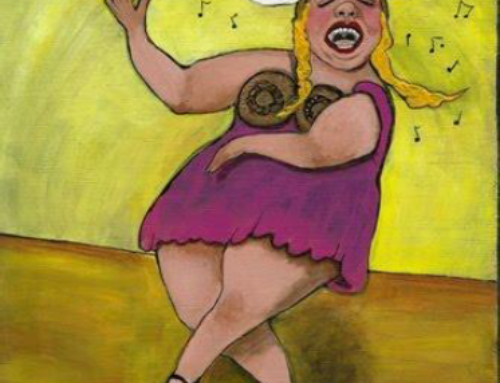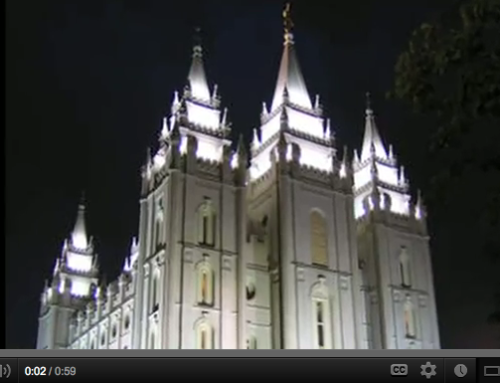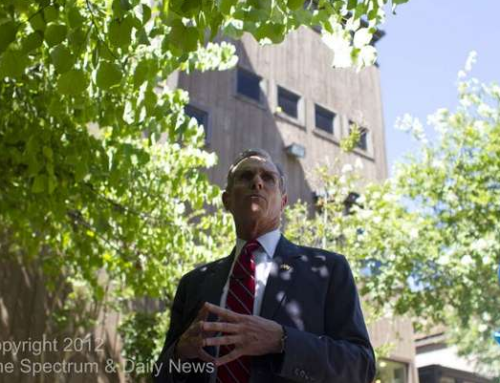The gay man who came out of the closet … as a Republican
Fred Karger’s bid for the US presidency is unlikely to succeed. But he may just change some attitudes in his own party, he tells Guy Adams
GUY ADAMS | Tuesday 22 November 2011

A gay, Jewish Republican walks into a bar. Then he sits down, orders a coffee, and starts earnestly discussing the progress of his campaign to become the next President of the United States.
That’s what happens when Fred Karger does a lunchtime interview. And if the premise of his bid for the White House sounds as if it belongs in a comedy routine, then so does his official slogan. Plastered across the bumper stickers and badges he carries in a briefcase, it reads simply: “Fred Who?”
The vast majority of the voters who encounter Karger on the campaign trail take that sentiment literally. In this (admittedly early) stage of election season, the bespectacled 61-year-old can pass through his native Los Angeles almost unrecognised. His poll rating is closer to zero than one per cent.
But Karger is deadly serious about his mission, which is to be the first openly gay presidential candidate to make it on to primary season ballot papers. And despite having no chance of even coming close to victory, he says that he is nonetheless confident of being able to alter the course of American politics.
“By just being around, I am making a difference,” he tells The Independent. “I am making a difference to the way other candidates view the gay community, and I’m sending a message to gay people: that you don’t have to hide your sexuality to achieve anything you want to in this life.”
Fred Karger may not be your average Republican, in a race that has seen almost every major candidate veer dramatically rightwards in support of the God-fearing tea-party vote.
But, unlike many a rival, he’s by no means a complete outsider to the election process.
For more than 30 years, Karger, who was raised in a conservative Chicago family, worked as a lobbyist. He built a prosperous career representing large tobacco companies and dispensing campaign advice to some of California’s most influential Republicans, including presidents Richard Nixon and Ronald Reagan, whom he assisted with media management.
Based in Los Angeles, Karger kept his homosexuality secret from colleagues, clients, and even his own family. He visited several psychiatrists in an unsuccessful effort to become interested in woman.
“It was terrible,” he says. “In the end, I decided to live as a gay man but keep it secret. I had a partner for a decade, and we lived together, but when my relatives came to stay, he would move out of the house. I had this double life.” After retiring from the lobbying business seven years ago, Karger emerged tentatively from the closet. Then he decided to make up for his previous discretion by embarking on a second career in gay rights activism. His first major role was a high-profile job in the campaign against Proposition Eight, the ballot measure which outlawed same-sex marriage in California in 2008.
Now he is aiming at the White House. And thanks to his insider’s knowledge of the political process, Karger is convinced he can make a mark. In a Republican field which currently includes eight “major” candidates and 22 others, his bankroll of $360,000 makes him the wealthiest of the “also-rans”.
“Some of the candidates you hear criticising the government for deficit spending have million-dollar deficits in their own campaign funds,” he says. “I’m doing this on a shoestring. I have six full and part-time staff members and have about a $25,000-a-month overhead, so I have the cash to stay in this thing through next August if I have to.”
Karger isn’t necessarily running to win. Instead, he hopes to further a cause. To this end, he has a two-pronged strategy. First, he will concentrate his limited resources on New Hampshire, one of the first states to vote in primaries, where an unexpectedly strong performance can elevate rank outsiders to the status of contender. “It’s a gaybird state, it’s the second least religious state in the country, and 42 per cent of all registered voters are undeclared or independent,” he says. “That means they can vote in either primary. They’re not going to want to vote in the Democratic one, because no one serious will challenge Obama, but in the Republican primary, well of course they might. So I think that 42 per cent of the votes are up for grabs.”
Karger’s second tactic is simply to refuse to go away. As the number of declared contenders for the Republican nomination dwindles, he hopes to leverage election law to force broadcasters to allow him to take part in high-profile televised debates. A similar ploy was successfully pursued by Shirley Chisholm, who in 1972 was the first African-American to run for the presidency.
“Chisholm was a member of Congress who stood as a Democrat,” he says. “Like me, she faced tremendous resistance, and had no mainstream media coverage at all. But when it became just two other candidates, Hubert Humphrey and George McGovern, she went to the Federal Communication Commission and got them to rule that she must be allowed to take part in a TV debate.”
Even if that fails, he has already managed to garner publicity. In August, his picture was plastered across the left-wing media after he ran into Michele Bachmann’s husband, Marcus – a psychiatrist who claims to be able to “cure” homosexuals” – on the campaign trail.
“Bachmann didn’t know who I was, so he let me pose for a photograph,” he recalls. “If you have your picture taken with someone, normally you put your arm around the person, but he got me in a bear hug. As for my young aide, he enveloped him, too.”
The photographs were passed to the gay Hollywood blogger Perez Hilton and the website Gawker, which published them with a piece that described Bachmann as “sexually enigmatic”.
Karger’s end-game is to shatter perhaps the greatest taboo of this Republican election season by publicly asking front-runner Mitt Romney, a lifelong Mormon, about his beliefs.
“When I was working on the Proposition Eight campaign, I did a lot of work on the Mormon church, and how they funded anti-gay legislation. If I get into a debate I intend to use that knowledge to cross-examine Romney, because although he keeps very quiet about it, he’s actually the perfect Mormon.”
Even if he never makes it on to that grand stage, Karger is adamant his candidacy will one day be seen as transformative. “I lived in the closet for so long and was just miserable about it, so I’m doing this for young people so they don’t have to live the life I did. In future, I just hope people look back on the 2012 election and say: ‘This guy made a difference’.”
A straight choice: The other candidates
Michele Bachmann
“This is a very serious matter, because it is our children who are the prize for [the gay] community, they are specifically targeting our children.”
Herman Cain
“The more toppings a man has on his pizza, … the more manly he is. Because the more manly man is not afraid of abundance. A manly man don’t want it piled high with vegetables! He would call that a sissy pizza.”
Mitt Romney
“We’re … designed to live together as male and female and we’re gonna have families … There’s a great line in the Bible that children are an inheritance of the Lord and happy is he who has or hath his quiver full of them.”




